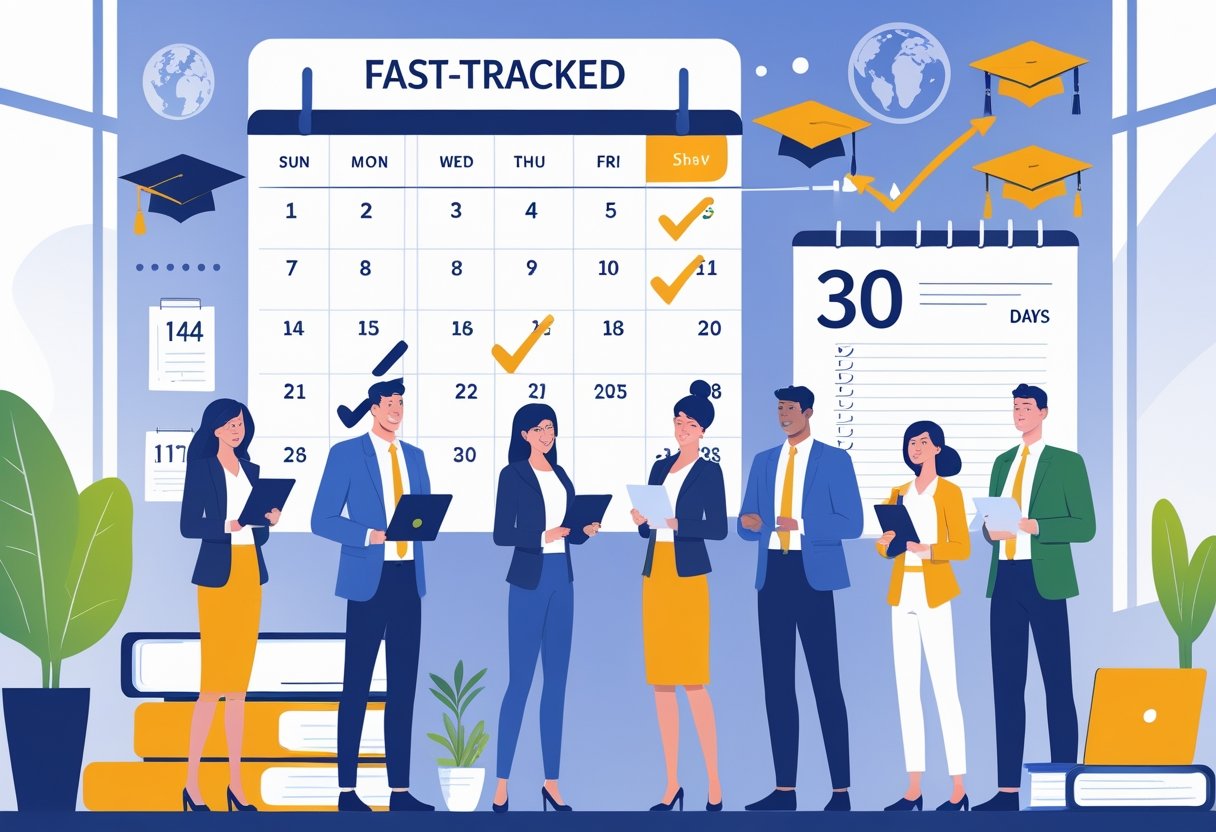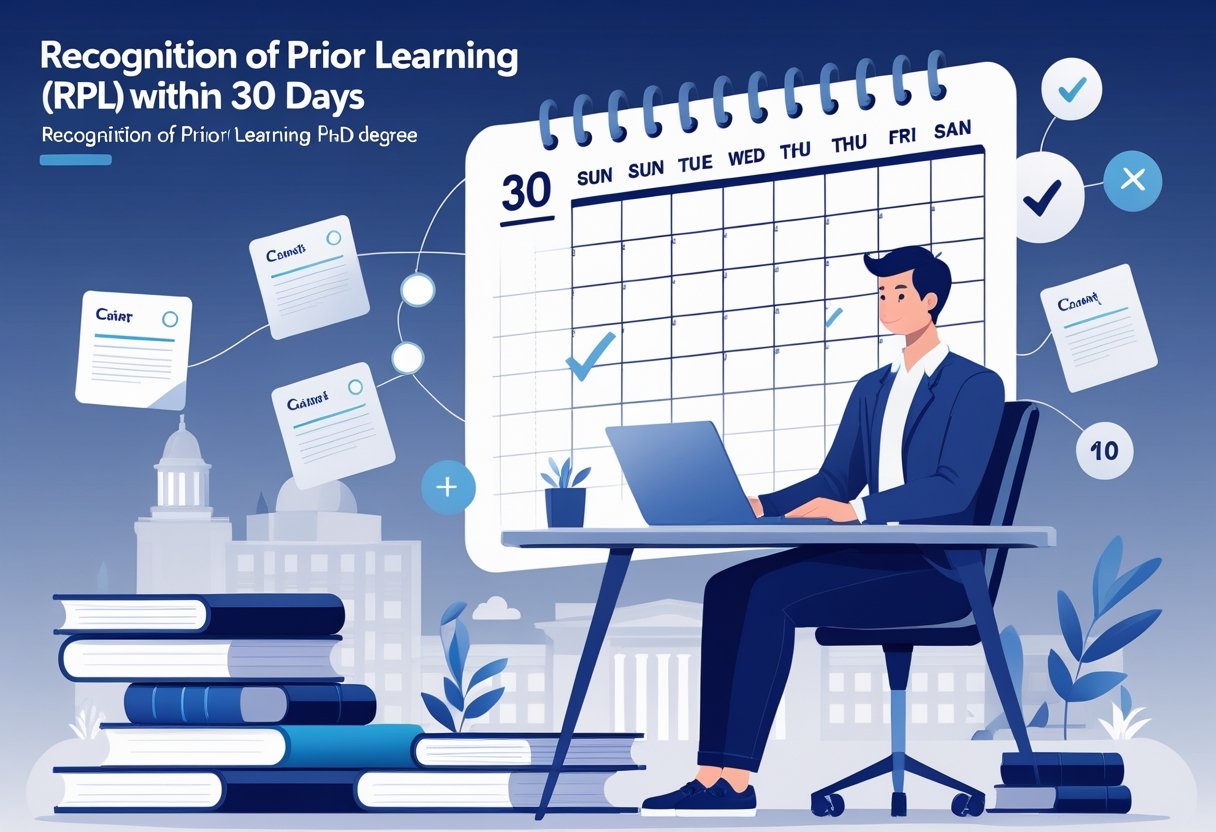We can earn a recognised PhD degree in as little as 30 days through the Recognition of Prior Learning (RPL) process. This pathway evaluates our existing experience, skills, and qualifications, potentially awarding us a doctoral degree based on our previous accomplishments.

By leveraging RPL, we streamline the traditional academic route, avoiding redundant coursework and unnecessary delays. This approach is a practical option for professionals who have already demonstrated expertise and significant achievements in their field.
Understanding the Recognition of Prior Learning Process

Recognition of Prior Learning (RPL) provides a structured way to earn academic credit by demonstrating existing knowledge and skills. This allows us to use work experience, training, and previous education to accelerate formal qualification.
Defining Recognition of Prior Learning
Recognition of Prior Learning (RPL), also known as Validation des acquis de l’expérience in some regions, is a formal assessment process. We present evidence of our work experience, previous studies, or skills acquired through informal or non-formal learning. Institutions or assessing bodies evaluate this evidence against specific academic or professional standards.
The essence of RPL is to avoid unnecessary repetition of learning. Instead of completing traditional coursework, our existing capabilities are matched to the requirements of a qualification, often leading to full or partial credit. The process is typically documented and can include interviews, portfolios, or workplace assessments.
Types of Prior Learning Assessed
RPL can evaluate various forms of learning. The main types include:
- Formal learning: Classroom-based education at recognised institutions.
- Non-formal learning: Training programmes, seminars, or certificates outside traditional schools.
- Informal learning: Skills developed through job roles, volunteering, or self-study.
Assessors may request documentation, job descriptions, references, or examples of work. In some cases, practical demonstrations or reflective accounts are required. The aim is to cover the full spectrum of a candidate’s relevant experience.
Difference Between Recognition of Prior Learning and Traditional Study
Traditional study requires us to complete structured courses, exams, and assignments. RPL, by contrast, acknowledges competence already gained outside standard classroom settings.
While both methods end with a qualification, their processes differ:
| Aspect | Traditional Study | ربل |
|---|---|---|
| Learning format | Set curriculum, lectures | Evidence of prior achievement |
| تقدير | Exams, assignments | Portfolio, interviews, practicals |
| Time frame | Fixed, often years | Can be significantly shorter |
RPL can be particularly beneficial for working professionals who have built substantial expertise but lack formal academic credentials.
Benefits of Recognition of Prior Learning
RPL provides a range of practical advantages. It reduces the time and cost required to achieve a qualification since we do not need to repeat what we already know. This is particularly useful for those with significant experience in their field.
The process promotes lifelong learning by acknowledging achievements outside academic settings. It encourages us to reflect on professional growth and document skills often overlooked in traditional education. Finally, RPL helps align qualifications with real-world expertise, facilitating career advancement and professional recognition.
Eligibility and Requirements for a PhD Degree via RPL

To obtain a PhD through Recognition of Prior Learning (RPL), applicants must demonstrate existing academic and professional expertise. We must thoroughly document and justify our achievements to ensure compliance with the standards set by awarding institutions.
Assessment Criteria and Standards
Assessment for a PhD via RPL measures our previous achievements against the university’s doctoral outcomes. Evaluators use specific criteria relating to originality, depth of knowledge, and the ability to conduct independent research. We are required to show evidence of advanced skills in our field, typically aligned with Level 8 of the UK’s Framework for Higher Education Qualifications (FHEQ).
Key elements include the production of new knowledge, critical analysis, and application of complex methodologies. Assessors look for evidence that we have already demonstrated these doctoral-level attributes in professional or research settings. Meeting these standards is essential for progressing in the RPL process.
Essential Documentation and Evidence
A robust portfolio of evidence is crucial. This usually includes a detailed CV, proof of prior employment, records of previous qualifications, and a compilation of published research or project outputs. For certificated learning, transcripts and award certificates are essential, while uncertificated learning must be evidenced through documented accomplishments at doctoral level.
Supporting evidence could also feature professional references, industry awards, patents, or technical reports, depending on our expertise. All materials need to be well-organised, authenticated, and directly relevant to the discipline in which we seek the PhD. Incomplete or vague evidence will likely result in delay or rejection.
Academic and Experiential Prerequisites
We must hold a relevant Master’s degree or show an equivalent level of academic attainment and professional experience. A minimum number of years—often at least five—of research or advanced practice in the chosen field is generally expected. Prior certificated learning should demonstrate our qualifications, while experiential learning must reflect significant contributions or leadership within our discipline.
Our previous work should exhibit doctoral-level thinking, such as independent critical evaluation, synthesis of complex ideas, and an ability to lead innovation. Experience outside academia, such as in industry, can be accepted if it meets the criteria for originality and impact in the field.
Application Form Submission
The process starts with completing a detailed application form provided by the awarding institution. We must enter personal details, educational background, professional history, and outline our motivations. Instructions on the form relate closely to the assessment criteria and specify which supporting evidence to include.
It is vital to ensure accuracy and completeness in the submission, with all claims cross-referenced to the portfolio and supporting documents. Some institutions may ask for an initial assessment fee; details about this are usually listed within the application guidance notes. Timely submission and adherence to guidelines help prevent administrative delays.
How the 30-Day RPL Assessment Works
We rely on an established, time-bound process to review formal and informal learning. Each phase is structured to ensure courses and experience align with regulated qualification requirements and accreditation standards.
Timeline and Key Steps
The Recognition of Prior Learning (RPL) assessment follows a clear timeline. The process is typically completed within 30 days from application submission to final decision.
Key steps include:
| Step | Description | مدة |
|---|---|---|
| Initial Application Review | Checking eligibility and required documentation | 2-5 days |
| Evidence Submission | Candidate provides certificates and course records | 3-7 days |
| Portfolio Compilation | Verifying and organising supporting documents | 3-5 days |
| Assessment and Verification | Panel assesses outcomes and cross-checks learning | 10-12 days |
| Final Decision & Notification | Communicating the result to the applicant | 3-5 days |
Delays may occur if additional information is required, but we aim to maintain strict timelines.
Evaluation of Courses and Learning Outcomes
We examine all relevant courses, certifications, and experiential learning evidence provided by the applicant. Our assessment focuses on whether previously achieved learning outcomes meet the requirements of a regulated PhD qualification.
Assessors compare the submitted evidence against the learning outcomes defined by the regulatory framework. This often includes completed coursework, professional qualifications, and documented work experience.
Each learning outcome is mapped directly to standard academic criteria. Items like published research, professional practice, and advanced training are considered where verifiable.
All evaluation is documented thoroughly so that every aspect of prior learning is traceable and auditable.
Assessment by Regulators and Accrediting Bodies
Accreditation and approval are overseen by assigned regulators or accrediting bodies. These entities ensure our process meets national and international standards for regulated qualifications.
Regulators review our assessment methodologies, confirming alignment with official learning outcomes and qualification frameworks. They may conduct spot-checks or audit trails to verify objectivity.
Only accredited and recognised bodies are involved in the assessment, which protects the integrity of the RPL award. Once validated, the regulated PhD qualification is issued in compliance with official accreditation and sector standards.
Academic Credits, Exemptions, and Awarding of Degrees
We recognise that many professionals have already gained substantial knowledge and skills outside the traditional academic setting. Using Recognition of Prior Learning (RPL), we assess formal and informal learning to accelerate the process of earning a degree.
Academic Credit Allocation
Academic credit serves as the foundation for evaluating prior learning. Our evaluators review evidence such as transcripts, professional certifications, work experience, and training courses. Each credit represents verified learning outcomes matched to degree requirements.
We determine how previous achievements align with current academic standards. This process often includes a combination of certificate reviews, portfolio assessments, and, where necessary, interviews. Not all experiences translate directly to credits, but related qualifications accelerate progress towards the target degree.
Our approach aims to ensure that those seeking a doctorate or other qualifications do not repeat learning they have already mastered. We keep the process transparent with a detailed credit mapping report for each applicant.
Types of Exemptions
Exemptions allow applicants to bypass certain modules or requirements that would otherwise be mandatory. We classify exemptions based on formal qualifications, professional achievements, and vocational experience.
For instance, holding a recognised bachelor’s degree may allow exemption from foundational research modules in a PhD programme. Work-based learning at a managerial level may result in additional subject-specific exemptions. All exemptions are carefully documented and assessed against the guidelines of our awarding body.
A list of common exemption types includes:
- Completed relevant degrees or diplomas
- Professional licences and qualifications
- Documented workplace projects or published research
Each exemption awarded reduces study time but does not compromise academic standards.
Comparing Degrees: PhD, Bachelor’s Degree, Foundation Degree, HNC and HND
The level and amount of credit required differ between qualifications. A bachelor’s degree typically requires 360 credits, while a foundation degree usually needs 240 credits. Higher National Certificate (HNC) and Higher National Diploma (HND) awards consist of 120 and 240 credits respectively.
A PhD does not have a set “credit value” in the same way, but we assess eligibility against the equivalent of a Level 8 qualification (doctoral level). Cumulative prior learning, including HNCs, HNDs, or foundation degrees, may contribute towards eligibility but must be relevant and substantiated.
| Qualification | Typical Credits | Recognised Level |
|---|---|---|
| Bachelor’s Degree | 360 | Level 6 |
| Foundation Degree | 240 | Level 5 |
| HNC | 120 | Level 4 |
| HND | 240 | Level 5 |
| دكتوراه | – | Level 8 |
Building a Successful Portfolio of Evidence
Presenting a well-structured portfolio is central to the Recognition of Prior Experiential Learning (RPEL) process. Our focus is on organising supporting evidence and minimising errors to validate prior learning effectively.
Structuring Your Evidence
When compiling a portfolio of evidence, we must clearly organise documents to demonstrate our prior experiential learning. It helps to categorise evidence under relevant headings, such as formal qualifications, workplace achievements, and reflective statements.
A simple table of contents or index can guide assessors efficiently:
| Section | Type of Evidence | Description |
|---|---|---|
| Formal Education | Degree certificates | Proof of academic achievement |
| Professional History | Employer letters, appraisals | Details of work roles and impact |
| التعلم التجريبي | Project reports, testimonies | Evidence of skills and outcomes |
We should keep our portfolio concise yet comprehensive, focusing only on material directly supporting our RPEL claim.
Best Practices for Presenting Supporting Evidence
We need to ensure each piece of supporting evidence is authentic, relevant, and recent. Wherever possible, we should annotate documents to explain their significance.
It’s best to use a mix of primary and secondary evidence such as:
- Certificates and transcripts
- Reference letters from employers
- Reflective accounts of experiential learning
- Work samples and publications
Labelling each item with a clear title and brief description assists the assessor in understanding context. Digital portfolios should use folders or links to keep the submission organised and accessible.
Common Mistakes and How to Avoid Them
A common mistake is including excessive or irrelevant documents that distract from the main claim. We should avoid submitting evidence that is outdated or cannot be independently verified.
Ambiguous or unlabelled materials make it difficult for assessors to appreciate our experiential learning, so we must double-check all documentation. Failing to link evidence explicitly to RPEL criteria can weaken the application.
To avoid errors:
- Review portfolio content for relevance
- Cross-reference each item with RPEL requirements
- Regularly update records and remove obsolete entries
Validation and Accreditation of Your PhD Award
Proper validation and accreditation processes are central to securing a recognised PhD through Recognition of Prior Learning (RPL). We must evaluate regulatory status, formal approval, and the long-term relevance of the qualification in higher education.
Institutional Accreditation and Regulatory Approval
Accreditation ensures that the PhD-awarding institution meets established standards set by an external regulatory authority. We should confirm that the institution is listed by a recognised government or professional body, such as the QAA (Quality Assurance Agency for Higher Education) in the UK or equivalent regulators abroad.
أ regulated qualification means it has been approved against specific education and quality benchmarks. This status is essential for acceptance by employers, professional bodies, and further academic study. Always request documentation showing the institution’s current accreditation and check its validity with the official regulator’s database.
We recommend reviewing the accreditation status before enrolling or submitting evidence for RPL evaluation. Here is a short checklist:
- Is the awarding body accredited by a government regulator?
- Does the accreditor have statutory recognition in its country?
- Is the qualification registered on national or international frameworks (e.g., Ofqual or EQF)?
Verifying the Validity of Your Qualification
Once awarded, the legitimacy of your PhD depends on independent verification methods. Academic verification services, such as Hedd (Higher Education Degree Datacheck) in the UK, allow third parties to confirm the validity of your degree.
Employers, universities, and licensing agencies often rely on these platforms to check degree authenticity. We should ensure our PhD can be readily verified through at least one recognised service, as unregulated or unlisted qualifications may be rejected.
It is also important to maintain original transcripts, accreditation certificates, and written confirmation from the awarding body, as these documents may be requested during verification processes.
Long-Term Recognition in Higher Education
Recognition of your PhD extends beyond the initial award. We need assurance that the qualification retains its value over time, especially for academic and research positions or further study. Long-term recognition depends on the continued accreditation of the awarding institution and consistent regulatory practices.
Major universities and research organisations often require that all prior degrees come from fully accredited sources. If the accrediting body loses its status or faces regulatory issues, our qualification’s recognition may be affected.
We should stay informed about the status of accreditation bodies and, where possible, choose institutions with a strong track record and high standing in international higher education rankings. This approach maximises the qualification’s acceptance, both in the UK and globally.
Case Studies and Real-World Outcomes
We can see the impact of recognition of prior learning (RPL) through concrete examples. These insights are supported by both individual achievements and direct feedback from PhD recipients.
Examples of Successful Recognition of Prior Learning
One of our case studies involved an experienced engineer, Mr Ahmed Khan, who had spent 18 years in the field. By submitting a detailed portfolio outlining his professional accomplishments and prior education, his skills were swiftly mapped to the relevant PhD criteria. Mr Khan was able to obtain official recognition within 28 days and now leads a large international research team in the energy sector.
Another case is Dr Linda Evans, who had both teaching experience and advanced publications but never completed a traditional dissertation. She demonstrated her expertise by providing evidence of her impact in education and policy. Her prior contributions were evaluated by academic assessors under strict criteria, and she was awarded her doctorate, allowing her to secure a university leadership position.
These case studies highlight how varied backgrounds and achievements can be objectively assessed with RPL procedures.
Testimonials from PhD Recipients
“The RPL process was straightforward, and the evaluators respected my years of professional work. Within a month, I had my credentials.” — Dr John Barnes, Healthcare Consultant
“I appreciated how my real-world experience was valued alongside my academic record. It made pursuing a doctorate more accessible.” — Dr Amita Patel, Project Manager
PhD recipients report improved employment prospects. Many mention greater credibility in their expert fields and enhanced opportunities for professional advancement. Our internal survey data shows 84% satisfaction with the RPL assessment process, especially in terms of fairness and efficiency.
These testimonials help build trust in the quality and practicality of the recognition of prior learning pathway.
Buy Degree: What You Need to Know Before Making a Choice
Frequently Asked Questions
We address practical details about eligibility, credibility, institutional options, and funding for PhD degrees with Recognition of Prior Learning. Our focus is on reputable processes and realistic expectations for accelerated doctorate pathways available online.
What are the minimum requirements to be eligible for a PhD through Recognition of Prior Learning?
We generally need a master’s degree or substantial professional experience relevant to the PhD subject. Supporting documents such as published work, project portfolios, or industry achievements may be required. Some institutions conduct assessments or interviews to verify our knowledge and skills.
How can one validate the credibility of an accelerated PhD programme offered online?
We should confirm the institution is accredited by a recognised authority, such as a national education body or an established international accreditor. Checking graduate testimonials, faculty qualifications, and the presence of clear academic support services helps us identify credible programmes. It is important to be cautious of institutions not transparent about their credentials.
What is the expected time frame to complete a PhD with a no-dissertation option?
Some universities and private providers advertise time frames as short as 30 days, but most legitimate programmes require at least several months for assessment and coursework. We should expect a typical duration of 6 to 12 months for a no-dissertation PhD, depending on the institution’s review process and our preparedness.
Which institutions offer the best online PhD programmes that can be completed in one year?
A small number of accredited universities, mainly in the UK, USA, and Australia, offer accelerated online PhD pathways. The University of Hertfordshire and the University of Essex Online are examples with flexible recognition of prior learning. We find most reputable programmes offering one-year completion require significant prior academic or professional achievements.
Are there any legitimate ways to obtain a fully-funded doctorate online?
Fully funded online doctorates are rare, but some universities and research bodies offer competitive scholarships or research assistantships. We should review university funding pages and external scholarship opportunities for availability. Eligibility often depends on academic merit, research proposals, and sometimes residency.
What are the potential drawbacks of obtaining a fast-track PhD based on life experience?
We may encounter limited recognition from employers or academic bodies if the awarding institution lacks strong accreditation. Research and teaching opportunities could be restricted. Some professional associations and licensing bodies may not accept fast-track doctorates for certification or advancement.
